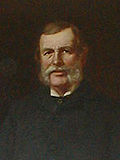Description

Prior to 1822, Boston was governed by the Boston Board of Selectmen. Boston voted in 1822 to incorporate as a city and adopted the Boston City Charter. On May 1, 1822, the Boston Board of Selectmen ceremonially handed over the city to the new government consisting of the newly established City Council and the newly established mayoralty. [1]
Under this original Boston City Charter, between 1822 and 1909, the city's legislative body was bicameral. This legislature, known as the Boston City Council, consisted of a Board of Aldermen that was elected at-large and a much larger Common Council with members that was elected from multi-member wards. [2] [3] [4] This Boston City Council existed along with a mayoralty that was established by the charter. [2]
After the Boston City Charter was rewritten in 1909, the Boston City Council was recreated as a nine-member unicameral body. [3]




































